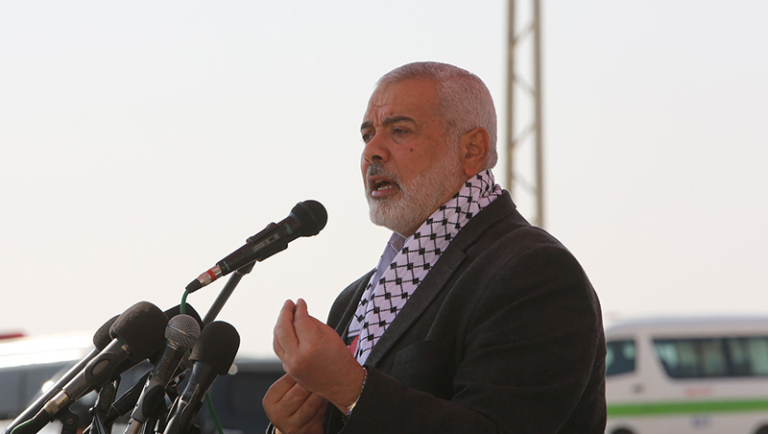
The head of Hamas’s Political Bureau Ismail Haniyeh was assassinated in Tehran while he was visiting Iran for the inauguration of its newly elected president Masoud Pezeshkian. All indications point to Israel as perpetrator; Israeli leaders have not denied responsibility for the political killing that comes a day after an Israeli strike in Beirut killed a senior Hezbollah commander, Fuad Shukr. It also comes less than a week after Israeli Prime Minister Benjamin Netanyahu returned from Washington, where he addressed a joint session of Congress and met with President Joe Biden and Vice President Kamala Harris. In a war with many bloody moments, this week’s events may prove to be among the most significant.
Netanyahu Unrestrained
On October 7, 2023, the state of Israel experienced its most significant and embarrassing security failure, perhaps ever. Netanyahu’s government had always boasted its security credentials and had spent the prior 10 months challenging the Israeli judicial system with an attempted power grab that divided the country and the security establishment. For Netanyahu, continuing the war on Gaza meant and still means keeping himself in power. After 10 months of sabotaging ceasefire deals and setting unachievable war aims, Netanyahu made it to the end of July, a crucial date on the political calendar. At this time, the Israeli Knesset would head for a three-month recess and during this time it could not vote to dissolve itself. The earliest that vote could come would be after the recess and then a legally mandated 90-day minimum campaign period would precede elections, were the body to actually dissolve itself.
In other words, getting through July meant that Netanyahu’s government would survive until at least 2025, giving him nearly six months without the constant threat of his government collapsing. This also means that Netanyahu’s government would remain in office through the American November election, allowing him to know who the US president is and campaign accordingly for his own reelection. At no point since Israel’s genocidal war on Gaza began has the Netanyahu government been so free of domestic or external constraints.
In Washington, the picture is quite different. The United States and its pipeline of weapons continues to be Israel’s most important strategic asset, and the domestic political picture there is up in the air. President Joe Biden is a lame duck president and Vice President Kamala Harris, who is running in November, cannot be entirely free of the domestic political costs of Biden’s policies. Netanyahu’s allies on the American right will jump at the opportunity to attack Harris if she backs away from fully supporting Israel and pro-Israel interests. Donors in the United States will reinforce this message. Netanyahu thus knows that pressure is less likely to come from Washington from now until November.
This window of greater freedom is giving Netanyahu the opportunity to goad Iran into the larger war he has long sought and to attempt to drag the United States into it. While killing Shukr in Beirut crossed a line in the Lebanon context where most back-and-forth fire had been largely limited to the south of Lebanon and the Galilee, the strike in Iran to kill Haniyeh crossed a different threshold and Netanyahu seems hell bent on crossing every threshold until he gets the war for which he has been looking, along with an American commitment to fight it for him.
Ceasefire Deal?
Haniyeh was part of the negotiating team that was interfacing with Qatari and Egyptian mediators to relay messages back and forth to Hamas leaders on the ground in Gaza. Killing him has both a functional and political impact on ceasefire negotiations. The assassination is the clearest message that Israel is not interested in an actual deal and is using ceasefire negotiations to extend the war while it kills Hamas leaders and manages global and domestic outrage over the destruction of Gaza and the hostages. Still, a ceasefire agreement is the best pathway to avoiding further death and destruction as well as a regional escalation of war toward which the region seem to be racing every day, thanks to Netanyahu’s killing spree.
The consistently missing ingredient in the ceasefire recipe is American pressure to deliver Israel’s agreement and compliance. It is hard to see that coming ahead of the election, but as American decision-makers are increasingly faced with the limited options of actually pressing Netanyahu and directly engaging in a larger regional war ahead of election day, calculations may begin to shift.
Impact on Hamas and Hezbollah
The Israeli military will certainly celebrate the killing of Haniyeh and Shukr. But what real impact will that have on Hamas and Hezbollah? Over the years the list of the two organizations’ leaders who have been killed by Israel is long and perhaps only rivaled by the growing list of recruits and weapons both groups have acquired over time. Israel has long preferred tactical short-term achievements over strategic victories, and in the short term there is little doubt that the killings of these leaders will have an impact on the organizations. In the long term, however, the record has shown that their resilience, fueled in part by the horrors the Israeli military committed against the Palestinians and the Lebanese, surpasses temporary setbacks such as assassinations. An absence of an Israeli vision with an alternative to perpetual war ensures that this pattern will continue and will likely escalate over time.
The views expressed in this publication are the author’s own and do not necessarily reflect the position of Arab Center Washington DC, its staff, or its Board of Directors.

